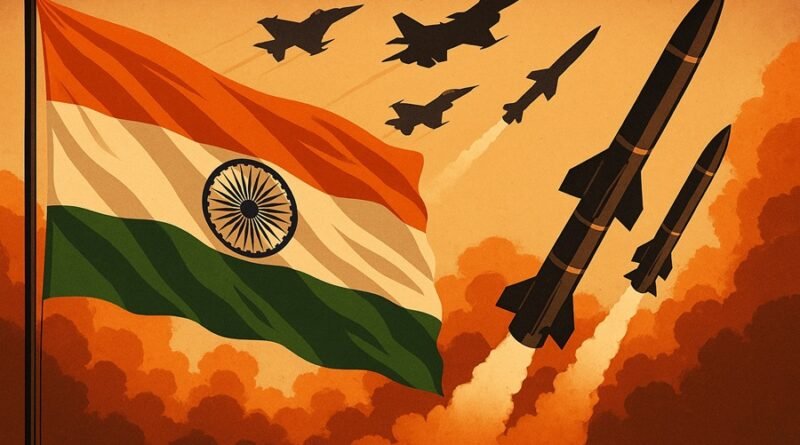PM Modi Declares Nuclear Blackmail Will Not Be Tolerated by India!
On Buddha Purnima 2025, Prime Minister Narendra Modi delivered a stirring national address that will go down in history as one of the most defining speeches in India’s fight against terrorism. Declaring that “Nuclear blackmail will not be tolerated by India,” the Prime Minister reaffirmed India’s commitment to safeguarding its sovereignty and protecting its citizens in the wake of Operation Sindoor, a bold military response to the Pahalgam terror attack of April 22.
This address wasn’t just a political statement—it was a proclamation of a new normal in India’s national security doctrine, setting unprecedented benchmarks for counter-terrorism operations in South Asia.
Operation Sindoor: India’s Precise Strike Against Terror
Prime Minister Modi began by expressing the nation’s pride and gratitude toward the Indian Armed Forces, intelligence agencies, and scientists for their swift and coordinated action during Operation Sindoor. In his words:
“Our brave soldiers displayed immense courage to achieve the objectives of Operation Sindoor. I dedicate this valour to every mother, every sister and every daughter of the country.”
This powerful tribute set the tone for what was to come—a comprehensive breakdown of how India responded militarily to a brutal terrorist act and redefined the boundaries of deterrence.
The Catalyst: The Barbaric Attack in Pahalgam
The Pahalgam terrorist attack on April 22 shocked the entire nation. Innocent civilians were brutally murdered in front of their families, targeted based on their religious identity. PM Modi, visibly emotional and resolute, said:
“The merciless killing of innocent citizens… was a very gruesome face of terror and cruelty. This was also a disgusting attempt to break the harmony and unity of the country.”
This inhuman act became the spark for Operation Sindoor, an operation that would not only punish the perpetrators but also send a clear and loud message to the global terror networks and their backers.
The Execution: A Swift and Decisive Military Response
In a dramatic revelation, the Prime Minister shared that on the night of May 6 and early morning of May 7, Indian forces executed precision strikes on multiple terrorist hideouts and training camps deep inside Pakistan.
“When India’s missiles and drones attacked terrorist bases in Pakistan, not only the buildings of terrorist organizations but their courage also was shaken badly.”
According to Modi, more than 100 terrorists, including several top leaders who had been operating with impunity for decades, were eliminated in one stroke. Key hubs like Bahawalpur and Muridke—described as “universities of global terrorism”—were among the prime targets.
No More Nuclear Blackmail
In one of the most defining moments of his speech, PM Modi addressed the issue of nuclear deterrence—a long-standing factor that has traditionally prevented military escalation in South Asia.
“India will not tolerate any nuclear blackmail. India will strike precisely and decisively at the terrorist hideouts developing under the cover of nuclear blackmail.”
This bold declaration marked a paradigm shift in India’s security policy. It made it clear that Pakistan’s strategy of sheltering terrorist groups under its nuclear umbrella would no longer shield it from India’s wrath.
From Reaction to Policy: A New Normal for India
Modi emphasized that Operation Sindoor was not an isolated action but a manifestation of India’s new counter-terrorism doctrine. He outlined three pillars of this approach:
- Immediate and decisive retaliation for any terrorist attack on India.
- Zero tolerance for nuclear blackmail.
- No distinction between terrorists and the governments that support them.
“Operation Sindoor has carved out a new benchmark in our fight against terrorism and has set up a new parameter and new normal.”
This represents a strategic shift from reactive diplomacy to proactive military deterrence, backed by India’s growing indigenous defense capabilities.
Pakistan’s Failed Response and Global Exposure
Modi revealed that in response to India’s offensive, Pakistan launched retaliatory strikes, targeting Indian civilian areas, religious institutions, and military bases. However, India’s robust air defense systems neutralized most of these threats mid-air.
“The world saw how Pakistan’s drones and missiles fell like straws in front of India.”
Eventually, after suffering heavy losses, Pakistan sought de-escalation, reaching out to India’s Director General of Military Operations (DGMO) on May 10. PM Modi emphasized that India had only suspended retaliation, not ended it, and would judge Pakistan’s future actions accordingly.
International Implications: Terror and Talks Cannot Coexist
Modi sent a strong message to the global community:
“Terror and talks cannot go together… Terror and trade cannot go together… Water and blood cannot flow together.”
He declared that any future dialogues with Pakistan would only revolve around two points:
- Counter-terrorism
- Pakistan-occupied Kashmir (PoK)
By doing so, India reinforced its moral and strategic high ground, signaling its unwillingness to normalize relations with a state sponsor of terrorism without concrete actions.
A Moment of Reflection: Peace Through Power
In a symbolic culmination to his address on Buddha Purnima, PM Modi evoked the teachings of Lord Buddha:
“The path of peace also goes through power. Humanity should move towards peace and prosperity. For this, it is very necessary for India to be powerful.”
He underscored that Made-in-India defense systems, used successfully in Operation Sindoor, have proven their mettle in modern warfare and showcased India’s technological and military advancement.
Conclusion: A Resurgent, Resolute India
PM Modi’s speech wasn’t just a retrospective of Operation Sindoor—it was a blueprint for future national security. With its no-compromise stance on terrorism and rejection of nuclear coercion, India has declared its position on the world stage loud and clear.
Operation Sindoor may have ended militarily, but politically and diplomatically, it has just begun to reshape the regional and global counter-terrorism narrative.
As Modi concluded:
“Zero tolerance against terrorism is the guarantee for a better world.”
Source: https://www.pib.gov.in/PressReleseDetail.aspx?PRID=2128268
DISCLAIMER: This is the approximate translation of PM’s speech. Original speech was delivered in Hindi.

